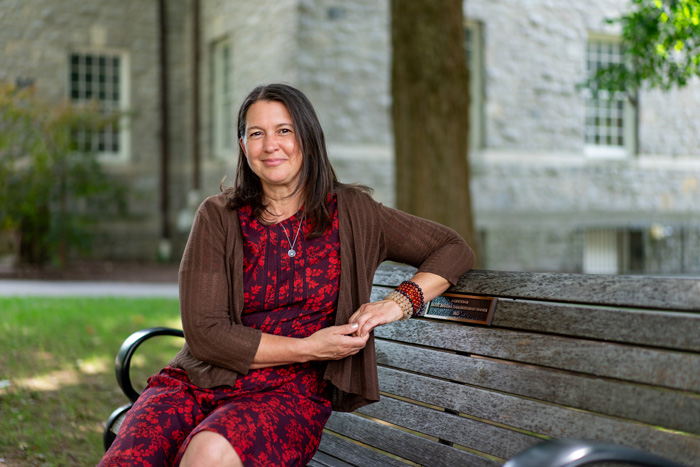Your Philanthropy Is Helping Us Innovate

A Q&A WITH DICKINSON’S NEW PROVOST AND DEAN OF THE COLLEGE RENÉE CRAMER
Renée Cramer joined Dickinson as the new provost and dean of the college On July 1, 2023. Cramer holds a doctorate and a master’s degree in political science from New York University and a bachelor’s degree in politics from Bard College. After teaching public law at California State University, she served as faculty and as deputy provost for academic affairs at Drake University in Iowa. There, she co-founded the university’s Center for Public Democracy. She also led accreditation initiatives that sparked changes in university priorities and culture around diversity, equity, inclusion and justice, and also to increases in student retention and student success. Cramer was additionally faculty senate president, co-leader of the Strategic Diversity Action Team and chair of the law, politics & society department.
Can you explain your dual role as provost and dean and tell us what excites you most about the job?
I lead the faculty and academic-affairs staff, creating opportunities for leadership and innovation, and I work closely with fellow members of President Jones’ leadership team. I also represent Dickinson to alumni, board members and external constituents.
I believe wholeheartedly in a liberal-arts education for the benefit of a larger good. And Dickinson is a place where people clearly care about each other and want to engage in all of what it means to be a scholarly community. Our students are articulate, engaged and focused, and our faculty and staff are world-class and devoted to students’ development. So we’re coming from a position of strength. I’m really excited by the interdisciplinary pedagogical innovation I see here.
What role does the donor community play in that innovation?
Our donors play a pivotal role in helping us innovate in the classroom and throughout the curriculum. We’ve seen this most recently at Dickinson through the data analytics program, where donors collaborated with faculty to address a need and an opportunity through an emerging strength at the college. They saw how critical data analytics is to shaping the future, and they understood Dickinson’s interdisciplinary liberal-arts approach and our current faculty could give us an edge in this field. Through their funding and good counsel, Dickinson launched a truly distinctive department and what has become one of our fastest growing majors.
But it goes beyond specific cases of co-innovation like this. Our donors facilitate pedagogical innovation at Dickinson with every gift they make. That can mean endowing a faculty chair that enables us to attract and retain top professors creating knew knowledge in their fields. It can mean supporting student-faculty research that helps faculty break new ground, while
What do you see as the biggest challenge in higher ed?
People often say, “enrollment and the demographic cliff ” when asked this question, based primarily on studies authored by Nathan Grawe [the author of Demographics and the Demand for Higher Education].I think many misunderstand what Grawe is actually saying. He’s saying we’re facing demographic challenges because the number of people we consider to be college- going, and the people who consider themselves to be college-going, is declining. This gives us the chance to reconceive of what it means to be someone who goes to college, like nontraditional students, transfer students and degree-completers. I'm curious about what this observation means in the Dickinson setting.
Some of the specific challenges we face at Dickinson include access, affordability and public perception. Now, our donors have been, and will continue to be vital, in helping us address the access and affordability challenge. And a lot of what it takes to address the public perception challenge comes down to translating what we’re already doing for a broader population. We know a liberal-arts education empowers students to be competitive in a quickly changing world. We have to say that in ways that speak to contemporary students and their families.
Speaking of challenges:You were the only one of your siblings to attend college and one of few in your graduating class who left your small hometown in South Dakota. What was that experience like?
Growing up where I did, I wasn’t prepared for college in the way that students in school districts with means were. We had no AP program. I placed out of classes and made my own curriculum; one year, I read all the Russian masters on my own. I showed up at Bard College, and everyone in the room knew how to pronounce the names in Plato.
Do you think your personal experiences give you a unique perspective on the needs of first-generation students at a liberal-arts college?
I have tremendous empathy for students who come into college thinking they have to choose a preprofessional major, because they don’t see the value of a mind-expanding education. We need to meet these students where they are and then show them the potential and possibilities. Here’s another place where donor support is hugely important. Through the Campaign for Scholarships donors are enabling the college to meet the full demonstrated need of every student we admit. That means donors are not only giving students access to this education but they’re also lightening the burdens of loans or other financial strains. This gives first-generation students, especially, the freedom to explore and find the majors in which they are most authentically interested. We know that kind of freedom leads to more student success, and it pays off for students down the road.
Published August 1, 2023